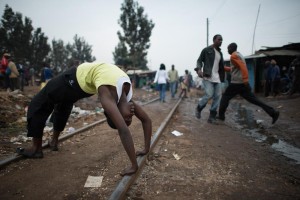On December 30th 2007, President Mwai Kibaki was once again sworn in as President of Kenya, despite the claims to victory of his rival: Raila Odinga. As a consequence riots erupted across Kenya, resulting in the deaths of 1,200 people and a further 500,000 forced to flee their homes to escape the violence.
Targeted ethnic violence became a massive issue, and as the situation escalated, even peaceful demonstrations were met with massive police violence. Political tensions were mirrored along ethnic lines resulting in massive chaos. It was in the context of these riots that Ashoka Fellow, Paige Elenson began her work with yoga as a means of reconciliation and social mobility.
Initially Paige Elenson, the internationally acclaimed yoga teacher, returned to Kenya with the intention of teaching a group of acrobats a yoga course. She had imagined a three week visit, in which she would be able to deliver a yoga training course to a group of young performers from a slum in Kiberia. Paige’s trip eventually lasted three months. She began to realise that yoga was a powerful force in bringing together a dramatically stratified society.
The polarisation of Kenyan society was particularly evident to Paige when she was invited to teach paid yoga classes at the United Nations in Nairobi. This new professional opportunity emphasised the deprivation in the slums of Kiberia – the other location of Paige Elenson’s classes. At the heart of Paige’s organisation, the Africa Yoga Project, is a desire to reconcile a dramatically divided society.
The Africa Yoga Project has had massive success over the last few years: currently it provides yoga teaching, training for unemployed young people and centres for health and wellness education across Kenya.
To date, around 70 per cent of young people categorised as ‘working class’ are unemployed in Kenya – this statistic relates to around 10 million people. Furthermore, of the 48 per cent of young people who are employed, 84 per cent could be categorised as ‘vulnerable workers’. The Africa Yoga Project is simultaneously meeting the need for stable, sustainable employment, and also more complicated and less quantifiable needs around wellness and wellbeing.
The Africa Yoga project offers a 200 hour, certified yoga course to young people, aged between 18 and 35. The course offers a solid support system for personal development and the potential for a significant income. Over 80 per cent of the teachers completing the course have moved from living below the poverty line to living in the middle income bracket. The wellbeing industry in Kenya has huge potential – in 2010 it was estimated that it would be worth $35,000,000 by 2016 – a forecast that emphasises the timely nature of Elenson’s work.
Already the Africa Yoga Project is creating self sustaining and self perpetuating social change. The project has trained over 100 young people who have then been required to deliver hours of yoga training to at-risk groups in Kenya – an initiative that has taken Paige’s work into places with many vulnerable people, from schools to prisons. She is creating her own circle of social change.
Paige Elenson’s work is important beyond its immediate impact and the direct delivery of wellbeing initiatives. It represents a change in the dialogue around health in Africa, instead of orientating around Kipling’s colonial ideology of ‘Bid[ding] the sickness cease’, it revolves around more sophisticated concept of wellness – approaching health and personhood in African countries with the holistic approach generally reserved for commentary on health initiatives in the liberal west.
From: Virgin Unite

